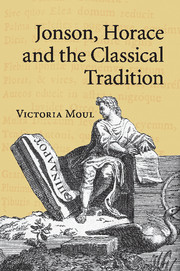Book contents
- Frontmatter
- Contents
- Acknowledgements
- List of abbreviations
- Introduction: imitation, allusion, translation: reading Jonson's Horace
- 1 Jonson's Odes: Horatian lyric presence and the dialogue with Pindar
- 2 Horatian libertas in Jonson's epigrams and epistles
- 3 Competing voices in Jonson's verse satire: Horace and Juvenal
- 4 Poetaster: classical translation and cultural authority
- 5 Translating Horace, translating Jonson
- Conclusion: More remov'd mysteries: Jonson's textual ‘occasions’
- Appendix: manuscript transcriptions
- Bibliography
- Index of passages discussed
- General index
- References
Bibliography
Published online by Cambridge University Press: 05 October 2010
- Frontmatter
- Contents
- Acknowledgements
- List of abbreviations
- Introduction: imitation, allusion, translation: reading Jonson's Horace
- 1 Jonson's Odes: Horatian lyric presence and the dialogue with Pindar
- 2 Horatian libertas in Jonson's epigrams and epistles
- 3 Competing voices in Jonson's verse satire: Horace and Juvenal
- 4 Poetaster: classical translation and cultural authority
- 5 Translating Horace, translating Jonson
- Conclusion: More remov'd mysteries: Jonson's textual ‘occasions’
- Appendix: manuscript transcriptions
- Bibliography
- Index of passages discussed
- General index
- References
- Type
- Chapter
- Information
- Jonson, Horace and the Classical Tradition , pp. 226 - 240Publisher: Cambridge University PressPrint publication year: 2010



